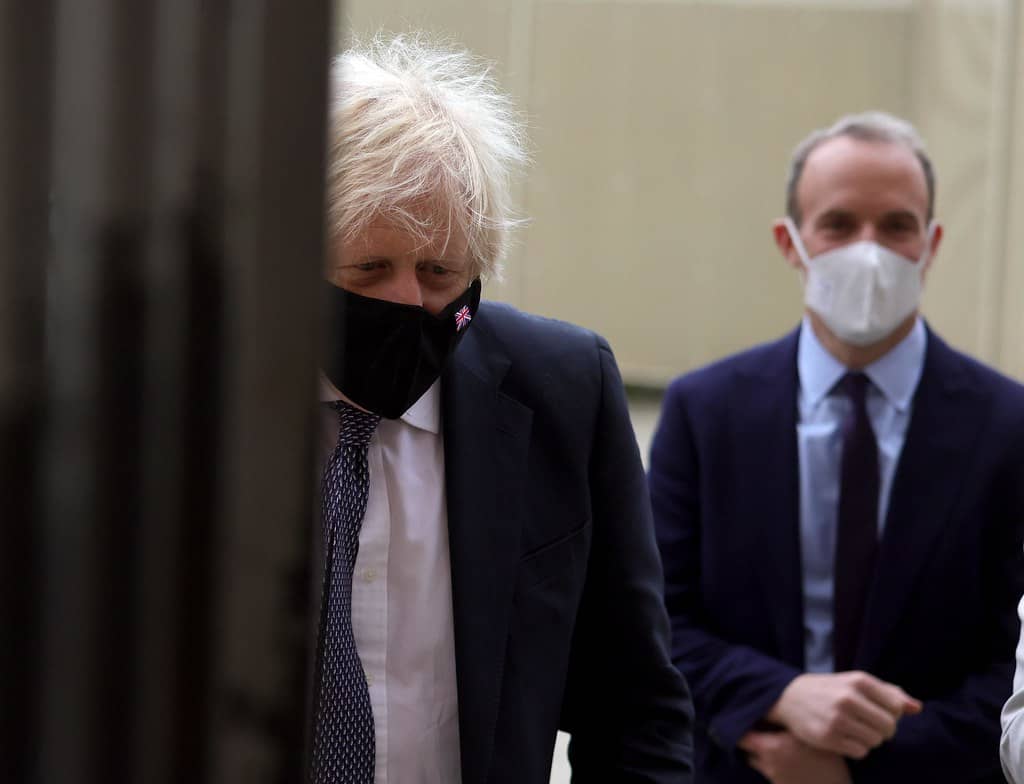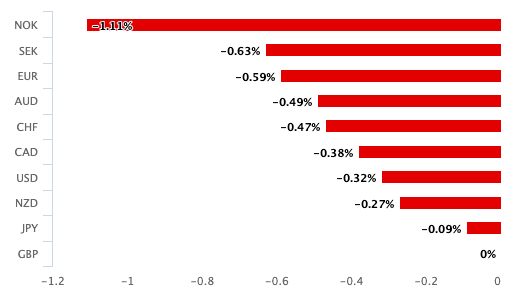Pound's Plan 'B Sell' Selloff Set to Fade
- Written by: Gary Howes
-
- Plan B to hit businesses
- GBP corrects lower
- As rate hike expectations at BoE are erased
- Stabilising market sentiment is supportive of GBP

Picture by Andrew Parsons / No 10 Downing Street.
The British Pound has lost value against most peers having been hit by the sudden introduction of new Covid-19 measures which threaten to slow the UK's economic recovery, however losses could soon give way to consolidation as recent events are incorporated into the currency's lower values.
UK Prime Minister Boris Johnson on Wednesday announced the implementation of the government's Plan B to fight the spread of the virus:
- Employees will be required to work from home where possible
- Vaccine passports would be required for entry to large events
- Mask usage will be mandated in more settings
The instruction to work from home poses the largest downside risks to the economy as it skews spending away from businesses concentrated in business districts, such as the City of London and West End.
"Fresh restrictions are a big setback for businesses, particularly for those in hospitality and retail who are in a critical trading period, as well as others such as transport," says Matthew Fell, CBI Chief Policy Director at the CBI, in response to the Plan B announcement.
The Pound to Euro exchange rate fell by a substantive 0.75% on the day the announcements were made to reach its lowest level in a month at 1.1626.
The Pound to Dollar exchange rate fell to a fresh one-year low at 1.3166.

Above: GBP fell against all its peers on Dec. 08. Image (C) Pound Sterling Live.
- Reference rates at publication:
GBP to EUR: 1.1658 \ GBP to USD: 1.3202 - High street bank rates (indicative): 1.1430 \ 1.2932
- Payment specialist rates (indicative: 1.1600 \ 1.3136
- Find out more about specialist rates, here
- Set up an exchange rate alert, here
- Book your ideal rate, here
"The pound is selling off on potential Christmas Covid & WFH/Plan B restrictions generating a roll back on BOE hike expectations for Dec. Would expect Sterling to continue weighing against both the USD & other G10. Looks to be further downside momentum ahead into year end," says Neil Jones, Head of FX Sales, Financial Institutions at Mizuho.
The imposition of fresh restrictions means the UK will lose its status as one of the most 'free' developed economies in terms of Covid restrictions; the new measures close any outperformance gap the UK had against the Eurozone where countries are seeing harsher measures imposed.
This lowering of economic performance expectations by the market could explain at least some of the selloff.
Analysts are meanwhile unanimous in their expectations that the latest developments will give the Bank of England reason to avoid raising rates on December 16.
"For GBP, the increased likelihood of limits on economic mobility comes just a week before a finely-balanced BoE meeting," says Daragh Maher, Head of U.S. FX Strategy at HSBC. "Our economists expect uncertainty over the Omicron variant to encourage policymakers to be patient."
Maher says the imposition of Plan B will favour the 'doves' on the Bank's Monetary Policy Committee and means rates will be hiked for the first time in February, at the earliest.
The question for Sterling going forward is to what extent expectations for rate hikes on the horizon are reduced.
As of writing - following news of further restrictions - the odds of a December rate hike are set at 0% according to IOS markets, having been at 33% the day prior.
A complete wipe-out of December rate hike expectations has now occurred and could allow for a floor in Sterling exchange rates to develop.
{wbamp-hide start}
{wbamp-hide end}{wbamp-show start}{wbamp-show end}
Of course, the market could now eat into February hike expectations and this could be a source of further weakness for the Pound.
But February is some months away and markets will be aware of the UK's high inflation rates and solid employment structure which would mean a rate hike remains a strong likelihood in early 2022.
"The fundamentals are still intact for hikes next year, with inflation and labour data surprising on the upside. Despite the delay, we continue to expect a similar path of rate hikes as before. We expect the next two rate hikes in May and November 2022, such that Bank Rate reaches 0.75% at the end of 2022," says Sonali Punhani, Chief UK Economist at Credit Suisse.
The Pound sunk after Prime Minister Boris Johnson rushed forward plans to introduce tighter Covid-19 restrictions on Wednesday as he came under intense political scrutiny over allegations a Christmas party was held in Downing Street in November 2020, when such gatherings were banned.
Despite denying this to have happened, irrefutable video footage emerged on Tuesday night that showed close aides to the Prime Minister knew of the party.
Amidst the storm, journalists from numerous publications and broadcasters reported 'Plan B' rules were being rushed forward, with some saying the move is part of a political diversionary tactic.
But, Further Measures are Remote at this Stage
Incoming data, initial research on the new variant and anecdotal evidence from health professionals in South Africa continue to suggest the Omicron variant is not the 'game changer' that was initially feared.
This should help create the supportive conditions that can support Pound exchange rates.
WHO's Tedros Adhanom Ghebreyesus said in a press conference his organisation was seeing some signs Omicron variant is milder than Delta, but not definitive. Source.
European Centre for Disease Prevention said all Omicron cases so far are asymptomatic or mild. Source.
Netcare CEO Richard Friedland said the group's 49 South African hospitals report only 2% of patients are on ventilators, and these are primarily trauma patients who incidentally tested positive for Covid-19.
"While we fully recognise that it is still early days, if this trend continues, it would appear that with a few exceptions of those requiring tertiary care, the fourth wave can be adequately treated at a primary care level," said Friedland. Source.
Secure a retail exchange rate that is between 3-5% stronger than offered by leading banks, learn more.
Laboratory findings from South Africa have found a significant reduction in the effectiveness of protecting against Omicron by vaccines and previous infections.
But Dr Alex Sigal, from the Africa Health Research Institute, said there was good news:
"Previous infection, followed by vaccination or booster is likely to increase the neutralisation level and likely confer protection from severe disease in Omicron infection".
The findings tally with what most scientists have been saying: the effectiveness of vaccines will be lowered but they will still offer protection against severe disease, particularly once booster shots are administered.
"Most vaccinologists agree that the current vaccines will still protect against severe disease and death in the face of Omicron infection," said Professor Willem Hanekom, Africa Health Research Institute executive director.
Pfizer said a third dose of their vaccine increases the neutralising antibodies 25-fold against the Omicron variant compared to two doses. The level is comparable to those observed after two doses against the original virus.
They believe two doses should still protect again severe disease.
Markets are looking more confident now that incoming information suggests vaccines will prevent the need for severe economy-crunching lockdowns.
The Pound is a 'risk on' currency that tends to benefit against the Euro and Dollar in times of economic optimism, therefore further gains for markets over coming days and weeks could well support the currency.
"Sterling is a typical risk-on currency that does well when equity markets are rallying and suffers when they fall," says George Vessey, a currency strategist at Western Union.
A lot of bad news now appears to be 'in the price' for the Pound and consolidation is becoming increasingly likely over the near-term.
"Sterling has recovered a little ground after sinking to a fresh YTD low yesterday on the government’s decision to go for Plan B. After dropping to under 1.3160, cable is back to 1.32. Sellers remain in charge until 1.3370 is cleared on the upside – signs of bottoming but strong enough to be confident of a rally just yet," says Neil Wilson, Chief Market Analyst at Markets.com.
